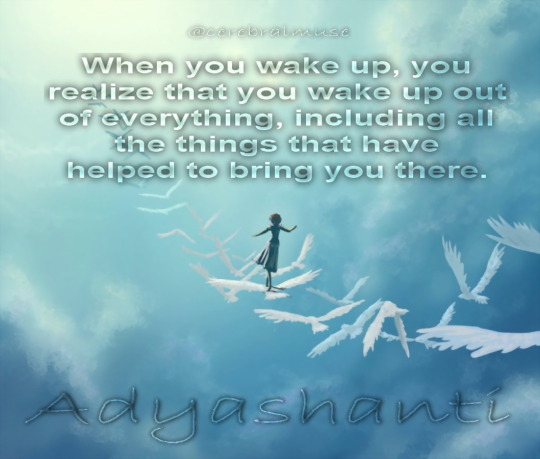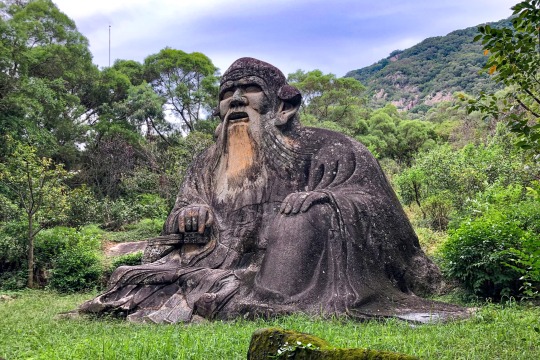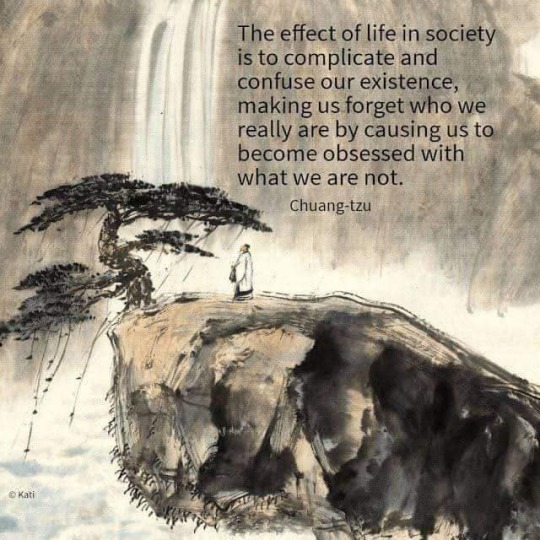#chuang tzu
Text
The effect of life in society is to complicate and confuse our existence, making us forget who we really are by causing us to become obsessed with what we are not.
— Chuang Tzu
600 notes
·
View notes
Photo

Josef Lehoučka (1923-1999) —Butterfly Dream [oil, canvas, plywood, 1982]
238 notes
·
View notes
Text

The Way Of Chuang Tzu, Thomas Merton
23 notes
·
View notes
Text

The fish trap exists because of the fish. Once you've gotten the fish you can forget the trap. The rabbit snare exists because of the rabbit. Once you've gotten the rabbit, you can forget the snare. Words exist because of meaning. Once you've gotten the meaning, you can forget the words. Where can I find a man who has forgotten words so I can talk with him?
~ Chuang Tzu
27 notes
·
View notes
Text

"During our dreams we do not know we are dreaming. We may even dream of interpreting a dream. Only on waking do we know it was a dream. Only after the great awakening will we realize that this is the great dream."
~ Chuang Tzu
[Thanks Ian Sanders]
14 notes
·
View notes
Text
The wise do not rejoice when they succeed or lament when they fail because they know that conditions aren’t constant”
Chuang Tzu
12 notes
·
View notes
Text
Musing on Laozi 5

First let's post two of the three translations of Laozi 5 that I am working with just for clarity, starting with William Scott Wilson's and then Dan G. Reid's, respectively:
Heaven and Earth are not out to make friends; Thus, they treat all creatures as straw dogs. The sage is not out to make friends; Thus, he treats the people as straw dogs. Perhaps this is something like a bellows between Heaven and Earth: It is empty, but never exhausted; It moves, and creatures are manifested endlessly. A lot of words will get you nowhere; Better to just stay centered.
Heaven and Earth are not (willfully) benevolent. The myriad things are treated no differently Than grass for dogs. Sages are not (willfully) benevolent. The hundred clans are treated no differently Than grass for dogs. The gate of Heaven and Earth Is it not like a bagpipe? Empty yet not finished It moves, and again more is pushed forth. To speak countless words is worthless. This is not as good as guarding balance within.
(I will bounce back and forth with the terminology used here.)
The first few lines of this chapter may be interpreted harshly. Plainly and literally, it tells us to treat the Ten Thousand-kinds-of-entities as straw dogs, items used as offerings to Heaven, according to Zhuangzi, and are thrown away when the ceremony is done. Many may think treating the myriad of things as “straw dogs” is harsh, but it teaches equality and impartiality with one’s benevolence ( 仁 ).
Heaven and Earth are not here to be “kind” or out to gain favors from us and befriend us. Which is why all creatures are “straw dogs” to Heaven & Earth. All the Ten Thousand-kinds-of-entities have their own inherent allotted capacities. Once capacities are used up, we transform; we change, and we dissolve from our corporeality. However, our dissolution of corporeality is not equal to the literal discarding of a ritual straw dog. The straw dog is nonetheless fated to be thrown away at the end of the ceremony, with little thought about it. Likewise, we are fated to die. For we are all equal in this one fact: We will change, we will transform, we will die. We are never exempted from our Fate. I will so naively say that The Sage is absolutely aware of this. The Sage takes this impartial judgment of the myriad things and is equally benevolent to all things. More plainly, the Sage treats all people and sentient beings as equals. Not wishing to befriend anyone for the sake of societal piety/expectations or because of rank, but instead dealing with everyone based on their own natural capacities, treating all people and sentient beings with 仁, benevolence, because that is Heaven & Earth and the Sage’s nature. When the Sage embraces the One with Heaven and Earth, the Sage remains empty, so he can be at one with and “filled” with Heaven (Laozi 11 & 22).
When Heaven & Earth and the Sage are not out to “make friends” or are “un-willfully benevolent,” they too treat the Ten-Thousand-kind-of-entities as straw dogs because it is in their impartiality where true benevolence arises. True benevolence begins with a reversion back to one’s original nature (Zhuangzi chapter 2.14.22), which is brought about by embracing the One (執一). According to Wang Bi’s commentary in chapter 10 of the Laozi, this embracement of the One is the true nature of human beings. Wang Bi goes on to further suggest that this “embracement of the One” purifies the spirit to an extent that the Sage is never separated from the abode and the One. Being never separated from one’s original nature (Embracing the One), benevolence is not displayed for things such as societal expectations or because the Sage must show it due to a certain partiality toward another human being (a friend, brother, sister, mother, or father).
Instead, the Sage abides by the tenet: “When you complete a meritorious deed, he backs out and goes home, for this is Heaven's Way.” (Laozi 9.) The meritoriousness of The Sage is so great, that they never try to make themselves known, yet when the Sage does act with unconscious intent, "creatures are manifested endlessly." I take this to mean people will follow the Sages for instructions because of their genuine display of benevolence. They are not consciously trying to attract followers for the sake of fame. Still, the myriad things flock to the Sage nonetheless because of the extremely unconscious impartiality and equality the Sage shows to all things. Likewise, the Sage acts without fabrication; he doesn’t fabricate friendships with people for societal piety or to display that they have many friends. If the Sage is fated to become more intimate with people, they simply do, never fabricating a relationship for personal benefit or societal gain. Instead, Fate will forge a relationship or partnership with the Sage because it will be of true benevolence and an entirely natural union (Laozi 3).
The sage has no preferences. They have no partial inclination to another sentient being, person, or external force. For if they indeed are One with Heaven and Earth, All things are regarded as straw dogs, which I hope is clear now that "straw dogs" are nothing more than a metaphor to orate the equality and impartiality we all should strive for. We see in the Essential Huainanzi 1.5 that:
When perception comes into contact with things, preferences arise. When preferences take shape and perception is enticed by external things, our nature cannot return to the self, and the heavenly patterns are destroyed.
This is also why the Sage does not allow external things to entice him as being joyous (helpful) or despairing (harmful). Still abiding by that impartial and equal behavior as displayed in Laozi 5. As Zhongi says in the Outer Chapters of the Zhuangzi 20.27.1-3:
Hunger, thirst, cold, heat, and the obstacles of poverty, these are the doings of Heaven and Earth, emanated by the movement of fate. By this I mean they happen together in conjunction with them. A minister who serves his sovereign dares not evade his commands; therefore, since one upholds the way of the minister as attentively as this, how much more attentively should one treat Heaven!
All this means is that the Sage does not treat what we call "harm" as actual "harm." The Sage keeps in step with Heaven and Earth, abiding by extreme impartiality and equality, as echoed in Laozi 5 and Huainanzi 1.5. I assume the "Hundred Clans" refers to the Hundred Family Surnames, a text composed during the Song Dynasty that lists five hundred and seven Chinese surnames. So when the Sage treats the hundred clans no differently than grass for dogs [straw dogs], this is just a more specified way of reiterating the first phrase of Laozi 5 about the actual population of China.
So what does it mean when the passage tells us A lot of words will get you nowhere; Better to just stay centered, or To speak countless words is worthless. This is not as good as guarding balance within? Heshang Gong's commentary illuminates these sentences perfectly. Here it is with the Chinese and English.
多言數窮,多事害神,多言售身,口開舌舉,必有禍患。不如守中。不如守德於中,育養精神,愛氣務言。
Having too many duties harms the spirit. Speaking too many words does harm to oneself. When the mouth is open, and the tongue cleaves to the roof of the mouth, there is sure to be misfortune and worries. It is not as good as guarding De (德) within. Nurture and support your spiritual vitality, cherish your energy-breath, and speak infrequently.
Heshang Gong explains here that when one speaks many words, all they are doing is displaying benevolence and righteousness. I am reminded of the Sophist in Plato's dialogues. The Sophist speaks just to speak, acting like they are experts on the subject they are discussing. Sophists are imitators of knowledge, virtue, and justice (Sophist 267 b-c). This is what Heshang Gong is trying to elude too. Sophists harm themselves by displaying themselves as experts in the subjects they orate about. While Socrates and Plato use many words, they always assert that they are not saying or knowing anything. As such, by "not saying anything," Socrates guards his inner vitality and moral virtue (德 De/Te). Heshang Gong is further saying that by 育養精神, we must nurture our inner spirit in a way that leads us to fewer words, fewer desires, and less knowledge (Laozi 3).
With these passages in mind, I hope it is ever clearer why the Sage and Heaven & Earth treat the Ten Thousand-kind-of-entities as "straw dogs." Typing this out and laying out other supporting literature greatly aids my understanding, and I hope the same can happen for you, the reader.
#philosophy#daoism#taoism#chinese philosophy#zhuangzi#lao tzu#laozi#huainanzi#chuang tzu#plato#sophist
10 notes
·
View notes
Text
You get something when it’s time. You lose it when it’s passed. If you are content with the time and abide by the passing, there’s no room for sorrow or joy. This is what the ancients called ‘loosing the bonds.’ If you don’t loose yourself, things will bind you.
— Chuang Tzu
691 notes
·
View notes
Text
“Let your heart be at peace.
Watch the turmoil of beings
but contemplate their return.
If you don't realize the source,
you stumble in confusion and sorrow.
When you realize where you come from,
you naturally become tolerant,
disinterested, amused,
kindhearted as a grandmother,
dignified as a king.
Immersed in the wonder of the Tao,
you can deal with whatever life brings you,
And when death comes, you are ready.”
― Chuang Tzu
9 notes
·
View notes





